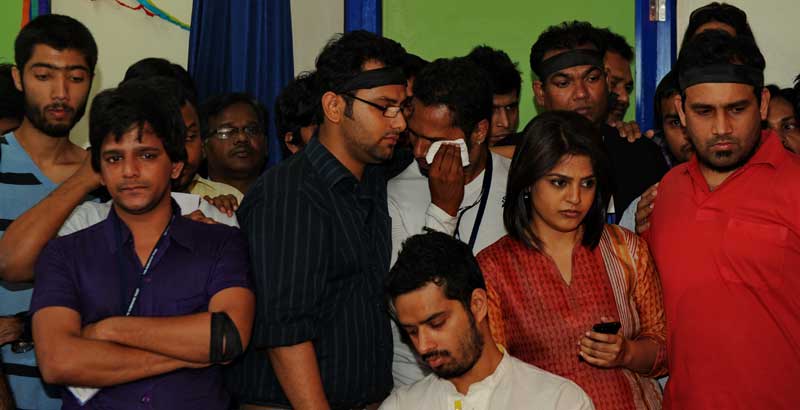
Debi is my niece, distantly related. She is very fond of cameras, so it is needless to say she is very interested in photography and, therefore, extra close to me. At 11, she was brilliant, and at 13, my most favourite photographer.
When she was 14, however, something distressing happened. We were travelling through a remote area by bike one day, when she began crying. I was afraid for a moment, thinking she had developed some kind of weakness or feelings for me, and I froze. Then I realised that she had broken down. She was clutching me so hard I felt my bones would crack, and she was howling. “Why the hell did I have to grow breasts?” she cried.
The photographs I took of her that day were the most difficult low angle shots I’ve ever taken, and the most powerful. She was looking directly into the camera, into my eyes, and I felt an unusual urgency to stop clicking and turn my camera away from her. “Kaku, I am a man, and I hope you won’t change the normal lens ever to shoot me.”
Soon after that day, she began coming to my place regularly to shave. She couldn’t confide about this to anyone at home, not to her family, not even to her mother. She was carrying a persona non grata inside her, even to her parents.
But she loved that person, as much as we do ourselves. Only, she was a little more committed to that person than any of us are. We, who have never had to think before we jumped into our parents’ arms, even after we grew up, who have never had to feel guilty for no fault of ours. Nobody at her place could make her feel at home.
On 2nd July, 2009, the Delhi High Court ruled that section 377 of the Indian Penal code – which dates back to 1860 and prohibits “carnal intercourse against the order of nature with any man, woman or animal” – was unconstitutional, and lifted the ban on gay sex for consenting adults.
Debi is much more than an adult now, and the humble owner of one of the most beautiful minds I have ever come across. I wonder, is it not punishable by law or a criminal offence to love her, a criminal, if she loves her partner tonight the way she prefers to, and the way her partner does in return?
She started living with her lesbian partner openly, and with the great satisfaction of being recognised, only after the Delhi High Court’s July 2009 verdict. Has she been committing a crime for the last four years, then? Would the honourable judges of the Supreme Court ensure the safety of my niece who, for the first time in her life, smiled from the depths of her heart that July afternoon?

Dear victorious petitioner, one of the biggest concerns you had was that homosexuality is a “western concept”. Can I ask, what were you wearing, my dear, when you filed the petition, or what the honourable Supreme Court judge was wearing when he disregarded the Delhi High court verdict?
Would it be a criminal offence if I quoted Wikipedia? I would like to take the chance. LGBT themes in Hindu mythology (from Wikipedia, the free encyclopedia):
“LGBT themes in Hindu mythology involve Hindu deities or heroes whose attributes or behaviour can be interpreted as lesbian, gay, bisexual or transgender (LGBT), or as having elements of gender variance and non-heterosexual sexuality. Traditional Hindu literary sources do not speak of homosexuality directly, but changes of sex, homoerotic encounters, and intersex or third gender characters are often found both in traditional religious narratives such as the Vedas, Mahabharata, Ramayana and Puranas as well as in regional folklore.
Hindu mythology has many examples of deities changing gender, manifesting as different genders at different times, or combining to form androgynous or hermaphroditic beings. Gods change sex or manifest as an Avatar of the opposite sex in order to facilitate sexual congress. Non-divine beings also undergo sex-changes through the actions of the gods, as the result of curses or blessings, or as the natural outcome of reincarnation.”
In this context, one example is that of the myth of Ardhanarishwar – the divine, composite androgynous form of Shiva and Shakti in a single icon –one of our most venerated idols and replete with philosophy. Similarly, in the Hindu epic myth Mahabharata, Arjuna spent the thirteenth year of his (and the Pandavas’) exile as Brihannala, a woman, after he was cursed by Urvashi the apsara.
To continue from Wikipedia, “Hindu mythology contains numerous incidents where sexual interactions serve a non-sexual, sacred purpose; in some cases, these are same-sex interactions. Sometimes the gods condemn these interactions but at other times they occur with their blessing.
In addition to stories of gender and sexual variance that are generally accepted by mainstream Hinduism, modern scholars and queer activists have highlighted LGBT themes in lesser known texts, or inferred them from stories that traditionally are considered to have no homoerotic subtext. Such analyses have caused disagreements about the true meaning of the ancient stories.”
I am completely confused. Am I going to be an outlaw if I continue to love my niece Debi the way I have always done, if she continues to love her partner the way she does before and after 2nd July, 2009?
Finally may i please refer myself as ‘i’ instead of ‘I’ henceforth?
The author is dna’s Photo editor.